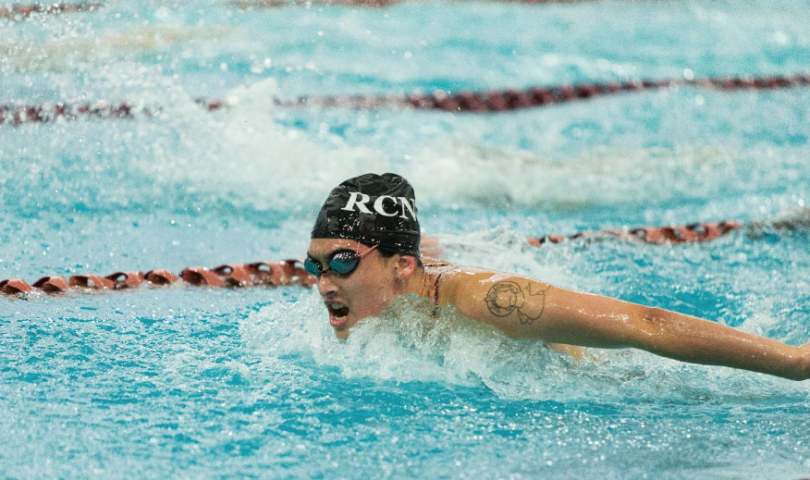“There was nothing I wanted more than to just be home in my own bed, away from it all, but I couldn’t do that.” That’s only a sliver of what was going through the mind of Ramapo women’s swim team member Meghan Cortez-Fields amidst a whirlwind of media scrutiny.
In the fall semester, Cortez-Fields began her first season on the women’s team after three injury-ridden years of competing on the men’s team.
“It was a difficult process,” Cortez-Fields said in an interview. “[The NCAA] doesn’t make the regulations easy to read… I don’t think they want to advertise that because they’re already getting hate for having trans athletes.”
Throughout her first three years at Ramapo, Cortez-Fields lacked time in the pool due to many factors. Her freshman year was limited to five weeks because of COVID. In her sophomore year, she faced an array of physical and mental challenges. Before reaching the METs in her junior year, a nagging hip injury essentially ended her season.
Between Cortez-Fields’ sophomore and junior years, she decided to switch from the men’s team to the women’s team, a process she knew would be challenging. To be eligible to participate on the women’s team, she spent the better part of her junior year meeting with doctors and taking medicine to meet the NCAA’s requirements for trans athletes, which involved lowering her testosterone to a specific level. During the process, she had the full support of the Ramapo athletics department and her coaching staff, including head coach Gary Orr.
“I told [Orr] my junior year that I wanted to be on the women’s team, and if I can, that’s great. If I can’t, that’s okay,” Cortez-Fields said. “He goes ‘No, that’s not okay, because this is something that you want, and I’m gonna do everything I can to make sure that you get it.’”
It was because of Orr that Cortez-Fields was able to wear a women’s suit in her junior year while still on the men’s team, which was typically not allowed in NCAA competition.
“I’ve spent 12 years wearing a speedo so wearing a part that extends further than that was weird,” she said. “But then it just became normal, I was coming into myself and it just felt right.”
By the time her senior season began, Cortez-Fields met the NCAA requirements and was officially a member of the women’s team. She started the season strong, posting a third-place finish in the season opener at Kean University and recording multiple first-place finishes across the next two meets against Susquehanna University and William Paterson University.
“I didn’t even know how to go out in public”
– Meghan Cortez-Fields
On Nov. 18, the team participated in the Cougar Splash meet at Misericordia University, where Cortez-Fields set a program record in the 100-yard butterfly with a time of 57.22. After a since-deleted post on the @rcnjswim Instagram page about her record, it became national news overnight. Headlines reading “Wrong and completely unfair” and “Death threats follow transgender swimmer’s victory” were posted within the days after.
“When I found out, I kind of broke down,” she said. “No one prepares you on how to navigate being thrown into the national spotlight… People [were] throwing all this hate and negativity towards me, and there was no way to stop it.”
One of Cortez-Fields’ biggest critics during that time was former college swimmer-turned-activist Riley Gaines. Gaines has spent much of her post-collegiate career campaigning against trans women in sports, including appearing in multiple political campaigns. The day after Cortez-Field’s record, Gaines took to X to post about the win, saying “Ramapo College swimmer in NJ goes from less than mediocre male swimmer to a record smasher competing against the women.”

“In her mind, I am just a political chess piece,” Cortez-Fields said. “It made me feel objectified. That’s why I declined so many news interviews at the time… they just wanted to use me… I didn’t care to be a part of any of that because I am a person who has their own life and is doing their own things.”
A native of College Station, Texas, Cortez-Fields was stuck dealing with the brigade of negative attention while being far away from her family. “I didn’t even know how to go out in public,” she said. “I would never go out alone for that whole month, because I didn’t trust anyone. It was also over Thanksgiving break, I wasn’t with my family but I really wanted to be. I was really struggling to navigate all of it.”
Cortez-Fields said she was grateful for Ramapo’s support, including when the school’s administration requested increased police presence at events. “They took it upon themselves to protect me and my team during that time,” she said. “There was just so much that we didn’t know. That was really scary.”
After completing her last final of the semester, Cortez-Fields took the earliest flight she could find to get back home. “I did not want to be here,” she said. “Being home it was like nothing was wrong… I just got to be happy being with my family and with my friends.”
Upon returning to Ramapo for the spring semester and competing in regular swim meets, Cortez-Fields set a new program record at the New Jersey Athletic Conference (NJAC) Championships in February with her time of 2:10.76 in the 200 IM. Once again, her story quickly became national news.
“I was prepared [this time],” she said. “I told myself if I do succeed, I know it’s going to happen, I know to private my social media and protect myself.”
Cortez-Fields also found support by looking at Lia Thomas, a former swimmer from Penn State University who went through similar situations.
“I think I knew what was to come because I know how people react to things that are new and foreign to them,” she said. “I called her an inspiration because I didn’t think it was possible to be trans and an athlete… What happened to her was just a warning to protect myself and tread lightly.”
While all of this was happening, Cortez-Fields says her parents have been her biggest supporters.
“[My mom] said ‘I just want to support you. I don’t have to understand everything, I just love you.’ It felt amazing that it didn’t matter who I was… That unconditional love and support definitely pushed me further and motivated me to accomplish things I didn’t think were possible,” she said.
“I’ve spent 12 years wearing a speedo so wearing a part that extends further than that was weird, but then it just became normal, I was coming into myself and it just felt right.”
– Meghan Cortez-Fields
At the NJAC Championships, her mother was there timing her race, which Cortez-Fields said was her favorite moment of the season. “I got to hug her after [the race]. Having her there for the whole tournament, flying out from Texas and it being one of my last meets, that was just amazing.”
As for what’s next for Cortez-Fields, she will graduate this spring and then attend Purdue University in the fall to pursue her Ph.D. However, this year marked her final one as a collegiate swimmer.
“I have been swimming for almost 15 years, I deserve a break,” she said. “I love swimming, but there’s so many other things I want to focus on and I want to accomplish.”
wjackso2@ramapo.edu
Featured photo courtesy of Ramapo Athletics






